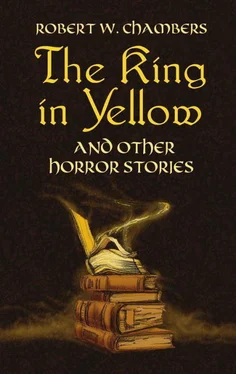“By Jove,” he said, “do you fellows know I have just seen the prettiest girl—“ An exclamation broke from the trio, gloomy, foreboding. like the chorus in a Greek play.
“Rue Barrée!”
“What!” cried Selby, bewildered.
The only answer was a vague gesture from Clifford.
Two hours later, during dinner, Clifford turned to Selby and said, “You want to ask me something; I can tell by the way you fidget about.”
“Yes, I do,” he said, innocently enough; “it’s about that girl. Who is she?”
In Rowden’s smile there was pity, in Elliott’s, bitterness.
“Her name,” said Clifford solemnly, “is unknown to any one, at least,” he added with much conscientiousness, “as far as I can learn. Every fellow in the Quarter bows to her and she returns the salute gravely, but no man has ever been known to obtain more than that. Her profession, judging from her music-roll, is that of a pianist. Her residence is in a small and humble street which is kept in a perpetual process of repair by the city authorities, and from the black letters painted on the barrier which defends the street from traffic, she has taken the name by which we know her,—Rue Barrée. Mr. Rowden, in his imperfect knowledge of the French tongue, called our attention to it as Roo Barry—”
“I didn’t,” said Rowden hotly.
“And Roo Barry or Rue Barrée, is to-day an object of adoration to every rapin in the Quarter—”
“We are not rapins,” corrected Elliott.
“ I am not,” returned Clifford, “and I beg to call to your attention, Selby, that these two gentlemen have at various and apparently unfortunate moments, offered to lay down life and limb at the feet of Rue Barrée. The lady possesses a chilling smile which she uses on such occasions and,” here he became gloomily impressive, “I have been forced to believe that neither the scholarly grace of my friend Elliott nor the buxom beauty of my friend Rowden have touched that heart of ice.”
Elliott and Rowden, boiling with indignation, cried out, “And you!”
“I,” said Clifford blandly, “do fear to tread where you rush in.”
II
TWENTY-FOUR hours later Selby had completely forgotten Rue Barrée. During the week he worked with might and main at the studio, and Saturday night found him so tired that he went to bed before dinner and had a nightmare about a river of yellow ochre in which he was drowning. Sunday morning, apropos of nothing at all, he thought of Rue Barrée and ten seconds afterwards he saw her. It was at the flower market on the marble bridge. She was examining a pot of pansies. The gardener had evidently thrown heart and soul into the transaction, but Rue Barrée shook her head.
It is a question whether Selby would have stopped then and there to inspect a cabbage-rose had not Clifford unwound for him the yarn of the previous Tuesday. It is possible that his curiosity was piqued, for with the exception of a hen-turkey, a boy of nineteen is the most openly curious biped alive. From twenty until death he tries to conceal it. But, to be fair to Selby, it is also true that the market was attractive. Under a cloudless sky the flowers were packed and heaped along the marble bridge to the parapet. The air was soft, the sun spun a shadowy lacework among the palms and glowed in the hearts of a thousand roses. Spring had come,—was in full tide. The watering carts and sprinklers, spread freshness over the Boulevard, the sparrows had become vulgarly obtrusive and the credulous Seine angler anxiously followed his gaudy quill, floating among the soapsuds of the lavoirs. The white-spiked chestnuts clad in tender green, vibrated with the hum of bees. Shoddy butterflies flaunted their winter rags among the heliotrope. There was a smell of fresh earth in the air, an echo of the woodland brook in the ripple of the Seine, and swallows soared and skimmed among the anchored river craft. Somewhere in a window, a caged bird was singing its heart out to the sky.
Selby looked at the cabbage-rose and then at the sky. Something in the song of the caged bird may have moved him, or perhaps it was that dangerous sweetness in the air of May.
At first he was hardly conscious that he had stopped, then he was scarcely conscious why he had stopped, then he thought he would move on, then he thought he wouldn’t, then he looked at Rue Barrée.
The gardener said; “Mademoiselle, this is undoubtedly a fine pot of pansies.”
Rue Barrée shook her head.
The gardener smiled. She evidently did not want the pansies. She had bought many pots of pansies there, two or three every spring, and never argued. What did she want then? The pansies were evidently a feeler toward a more important transaction. The gardener rubbed his hands and gazed about him.
“These tulips are magnificent,” he observed, “and these hyacinths——“ He fell into a trance at the mere sight of the scented thickets.
“That,” murmured Rue, pointing to a splendid rose-bush with her furled parasol, but in spite of her, her voice trembled a little. Selby noticed it, more shame to him that he was listening, and the gardener noticed it, and, burying his nose in the roses, scented a bargain. Still, to do him justice, he did not add a centime to the honest value of the plant, for after all, Rue was probably poor, and any one could see she was charming.
“Fifty francs, Mademoiselle.”
The gardener’s tone was grave. Rue felt that argument would be wasted. They both stood silent for a moment. The gardener did not eulogize his prize,—the rose-tree was gorgeous and any one could see it.
“I will take the pansies,” said the girl, and drew two francs from a worn purse. Then she looked up. A teardrop stood in the way refracting the light like a diamond, but as it rolled into a little corner by her nose, a vision of Selby replaced it, and when a brush of the handkerchief had cleared the startled blue eyes, Selby himself appeared, very much embarrassed. He instantly looked up into the sky, apparently devoured with a thirst for astronomical research, and as he continued his investigations for fully five minutes, the gardener looked up too and so did a policeman. Then Selby looked at the tips of his boots, the gardener looked at him and the policeman slouched on. Rue Barrée had been gone some time.
“What,” said the gardener, “may I offer Monsieur?”
Selby never knew why, but he suddenly began to buy flowers. The gardener was electrified. Never before had he sold so many flowers, never at such satisfying prices, and never, never with such absolute unanimity of opinion with a customer. But he missed the bargaining, the arguing, the calling of Heaven to witness. The transaction lacked spice.
“These tulips are magnificent!”
“They are!” cried Selby, warmly.
“But alas, they are dear.”
“I will take them.”
“Dieu!” murmured the gardener in a perspiration, “he’s madder than most Englishmen.”
“This cactus——”
“Is gorgeous!”
“Alas——”
“Send it with the rest”
The gardener braced himself against the river wall.
“That splendid rose-bush,” he began faintly.
“That is a beauty. I believe it is fifty francs——“ He stopped, very red. The gardener relished his confusion. Then a sudden cool self-possession took the place of his momentary confusion and he held the gardener with his eye, and bullied him.
“I’ll take that bush. Why did not the young lady buy it?”
Mademoiselle is not wealthy.”
“How do you know?”
“ Dame, I sell her many pansies; pansies are not expensive.”
“Those are the pansies she bought?”
“These Monsieur, the blue and gold.”
“Then you intend to send them to her?”
Читать дальше












